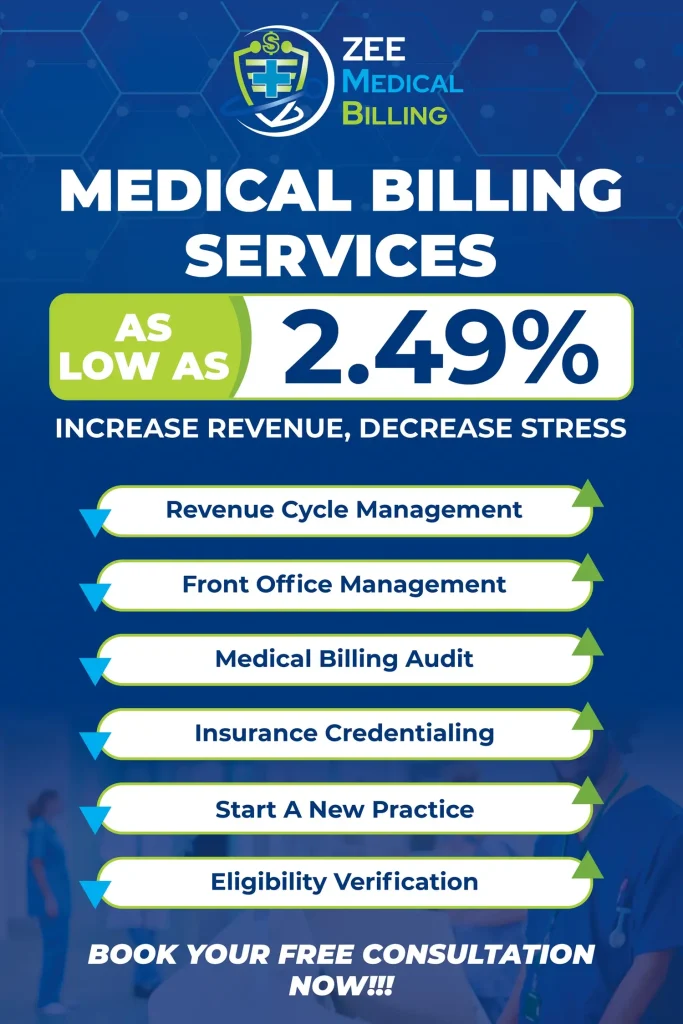In the consistently developing healthcare universe, medical billing experts play a pivotal role in guaranteeing that healthcare providers are reimbursed promptly and precisely for their services. Claiming inaccuracies can prompt delayed payments, expanded denials, and a significant impact on a practice’s revenue cycle. The following are essential ways to further develop claim accuracy and streamline the billing process.
1. Verify Patient Data
Precise patient data is the cornerstone of a successful claim submission. Continuously double-check:
- Patient’s complete name, date of birth, and address
- Insurance ID number and group number
- Coverage details, including copayments and deductibles
Using tools like eligibility verification can assist with affirming insurance details and coverage status before claims are submitted.
Read More: Boosting Hospitalist Benefits with These 3 Billing Hacks
2. Stay Updated on Payer Policies
Insurance companies frequently update their approaches, rules, and coding requirements. Remaining informed about these changes can prevent errors in claim submissions. Routinely review payer announcements and subscribe to updates from significant insurance carriers.
3. Use Precise Coding
Appropriate coding is important for claim approval. Medical billing professionals should:
- Stay updated with Current Procedural Terminology (CPT), International Classification of Diseases (ICD-10), and Healthcare Common Procedure Coding System (HCPCS) codes.
- Avoid upcoding or undercoating, as these practices can prompt claim denials or reviews.
- Invest in regular training or confirmation courses to guarantee ability in coding guidelines.
4. Perform Regular Audits
Conducting regular internal audits distinguishes common errors and areas for development. Focus on:
- Guaranteeing that documentation supports the codes used
- Reviewing denied claims to figure out patterns or repeating issues
- Correcting mistakes to limit revenue loss
5. Implement Claim Scrubbing Software
Claim scrubbing software can altogether reduce errors by checking claims for:
- Coding errors
- Missing or invalid data
- Non-compliance with payer guidelines
These tools flag potential issues before submission, considering corrections in real-time.
6. Train and Educate Staff
A well-trained team is important for keeping up with claim accuracy. Regular training sessions on billing practices, compliance updates, and new advances guarantee that staff stays proficient and knowledgeable.
7. Monitor Denials and Appeals
Tracking claim denials gives important experiences into trends and potential errors in the billing system. Develop a robust appeals process to successfully address denials:
- Recognize the reason for denial and correct it promptly.
- Resubmit claims with the vital adjustments.
- Keep detailed records of denial trends to illuminate process improvements.
8. Leverage Technology
Modern medical billing systems offer high-level features like automated claim submissions, real-time updates, and analytics tools. These systems can:
- Reduce manual errors
- Improve workflow efficiency
- Give actionable information to improve claim success rates
9. Communicate Effectively with Suppliers
Strong communication between billing staff and healthcare suppliers is important. Encourage suppliers to:
- Document services completely and precisely
- Explain any ambiguous or incomplete notes before coding.
- Give brief updates on patient encounters and treatment plans.
Read More: ZMB Urgent Care Billing: Pick Wisely or Pay the Price
10. Stay Compliant with Regulations
Compliance with healthcare regulations is non-negotiable. Dive more deeply into:
- The Health Insurance Portability and Accountability Act (HIPAA)
- Medicare and Medicaid rules
- Fraud and abuse prevention measures
Keeping up with compliance ensures ethical practices and reduces the risk of legal issues.
Final Thoughts
Further developing claim Accuracy is a continuous process that requires attention to detail, regular training, and the utilization of advanced technology. By carrying out these essential tips, medical billing professionals can reduce errors, upgrade proficiency, and add to a more effective revenue cycle. In a field where accuracy matters, these strategies pave the way for progress.









